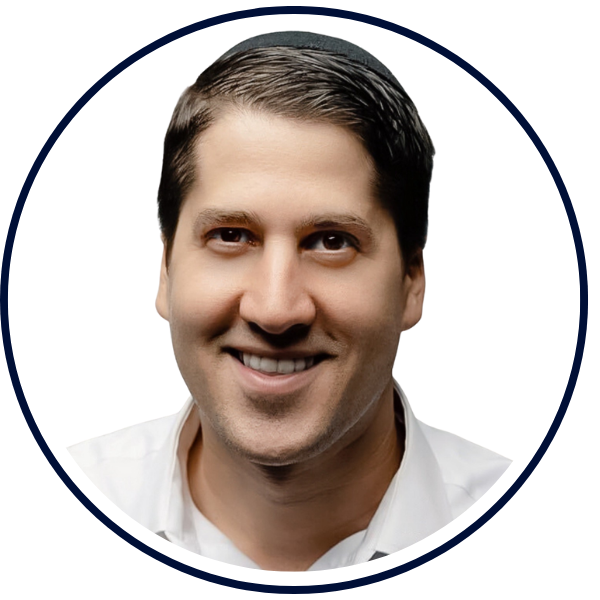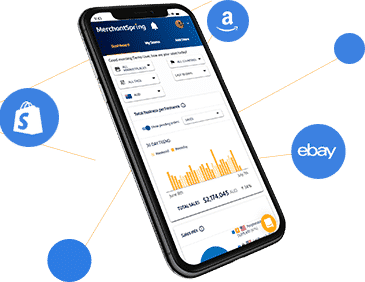Podcast transcript
James Dihardjo
Thank you so much for making time to chat with me all the way from New Jersey, man. I just wanted to kind of handle straight to you and ask you to introduce yourself, who you are, who's Getida and just tell us a bit about yourself.
Yoni Mazor
You got it. So first of all, thank you so much, James, for having me, on the show. It's an honor. I'm very excited. Yeah. So my name is Yoni Mazor. I'm one of the co-founders and the Chief Growth Officer of Getida. So Getida essentially we're a technology company and our mission is to help Amazon FBA sellers get the maximum FBA reimbursements that they're eligible to receive.
So typically what happens is an Amazon seller connects to Getida, our technology is able to go back on their data for about 18 months with all the FBA transactions. So any of the inventory that gets lost or damaged or destroyed, disappeared, disposed or overcharged with fees, our technology catches the issue.
But then we also have a team of Claims Specialists. A big part of them are former Amazon employees, used to work on Amazon in the FBA reimbursements department, and they manage all the back and forth with Amazon until there's a resolution. For example, if they lost your inventory and our technology catches that. Our team opens a case and Amazon takes a look and investigator finds the inventory. It's all great. Resolved.
If they don't find the inventory and that missing inventory is eligible for reimbursement, Amazon will then provide a reimbursement. And only if they do, only if there's a recovery, we charge a fee. We charge a 25% fee. Besides that, there are no other fees. There's no subscription. It's free to join. It's free to stay. We only charge a fee based on recovery. And today we're the largest organization in the world dedicated just for this mission. The mission of Amazon FBA auditing and reimbursements. We have a global team in six countries. I have about 116 people as of today. And, that's it. That's kind of a little bit about myself. What we do, the mission, the purpose, and the scope.
James Dihardjo
Awesome, that all makes total sense. And I can see how you guys add a ton of value for sellers. But I just wanted to segue into the most recent thing, which is we were both at Prosper, right? So, I just wanted to ask you, what did you take away from that? Any new learnings, any new ideas? Keen to hear your thinking.
Yoni Mazor
Yeah. So over the years, what I see in Prosper, it's funny because the first Prosper Show was in 2016. It was in Utah actually. And then, the next year was in Las Vegas. And since then it stayed. And the first year of 2016, a lot of the sellers were resellers. They're just reselling big brands, you know, Nike, Adidas, Casio, whatever, all these brands. And over the years, the trend is definitely pivoting towards private-level sellers.
So back in 2016, it was more like, okay, we’re pricing wars, sourcing. You know, fast forward six years to 2022. Branding, sourcing for your own brand, not sourcing from, distributors and brokers in the following. So, I would say like, probably the overwhelming majority of the sellers that came in, 70-80% of them are all into private labels and, they're really creating a valuable business. They're really focused on that. Having a brand, a brand identity, and recognition by consumers on Amazon, off Amazon. It could be your Shopify, or it could be Walmart. So there are more sprouts of other marketplaces and more awareness. Even though the Prosper show is the main show for Amazon sellers, there's definitely more awareness and focus on having brands that are definitely active on Amazon because it's just the beast you cannot ignore.
But also being open to other marketplaces on a domestic American level, but also on a global level. Right? You also have global marketplaces that are on top of mind for many of the sellers. Yeah, that's kind of the nuances that I've seen over the years. But it's always a magic show in terms of networking, realizing like new players that are out there that are doing, good solution providers. Because I just want to explain a little bit on the show. The show there's pretty much two places: The exhibition hall where you have all these solution providers exhibiting their software, their tools, and services, which is cool because it was bigger than ever. This year, I think there were more than 160 of them, and at the first Prosper show there were maybe half a dozen.
It shows you boom, the impact over the years. But then of course you have the tracks of all the presentations and all the speeches and the actual conference, and it has its own tracks. One track is about advertising, the other one is about sourcing. Another one is logistics. So you have all these industry leaders, presenting and talking about and the sellers taking notes and asking questions and interacting. So all of that is a beautiful myriad of, of all the things that an industry, which is very, fast-growing kind of needs at this point to keep on growing and keep fertilizing itself.
James Dihardjo
Yeah, that all makes sense. And I think, you know, you've just sold me on returning to Prosper in 2023. It’s not just to see you but you know, I know that you're a global man like I know you and Eytan have just come back from the UK as well and for another Amazon thing and I just wanted to ask as well, given that you're in so many places, you work with so many sellers you're aware of like the multi-channel thing, what are your predictions for 2022? Like you just, you touched on what you're seeing now, but what do you think we'll see change all coming around the corner for this year?
Yoni Mazor
Got it. So I think we had a few good years of hypergrowth run and think we were just working all around. But now this is the year of challenges 2022 and especially on the operational level, you know, the global supply chain has took a major hit. Things are not as easy to source as used to be. There are a lot of late shipments and you get late shipments. You can't restock on time, you're losing rank. How do you solve these issues, these problems? So you have to really vividly focus operationally on, not even growing more, like even maintaining or surviving for some of them, for some of these assets, some of these products, some of these listings. Okay. And of course, that also affects launching. You know, you can't launch and be successful as quickly. Because you expected your inventory to be there within three weeks. Now it takes, six or nine weeks, right? These things kind of slow down the whole projection for everybody.
It'll be interesting to see how sellers survive this. All these global supply challenges and inflation. Everything is becoming higher to source. The cost of shipping, the cost of manufacturing, and the cost of labor all around the world, also in the United States. So, but you are in a marketplace where it's in a raise down, right? It's in the race of the bottom. So what do you do? How do you survive this on the marketplace? You got to keep your costs low to stay competitive and you keep your rank, but everything else is around you.
All these costs are raising. So what is the breaking point where a lot of the sellers start to raise their prices according to inflation and give up to the global trend of the economy of inflation. So inflation and global supply chain operations, this is the year that will require a lot of focus from the sellers and it is going to be survival of the fit, or the fittest and we'll see how that plays.
James Dihardjo
On that. That's a really good point. Just on that thing, so survival of the fittest, like what do you think will separate the fit from the unfit? Like is there a key thing, you're seeing, perhaps it's capturing reimbursements, but, what's the key differentiator there?
Yoni Mazor
Yeah, the reimbursements. Yeah, it's a long improve for me. I'd rather try to climb higher for you guys. So, honestly, it's grit. That grit that drive, that creates a really good sustainable Amazon seller business. Is that all these scratches that come at you. I don't not say immune, but you get scratched, you bleed even, but you're able to really patch it up, take care of it, nourish it, and keep growing.
So it doesn't really ruin your or kill you. So I think grit, focus, hard focus on the numbers, doing above and beyond for your business. If your organization to be really survive these things, you do by networking, reaching out, just hustling, the hustle is real. So even this big, big organizations called aggregators that raise billions of dollars worth of money to buy all these brands, and now they have a portfolio brand.
Now they're, they're hustling hard. It's, they're working. And it was very, very romantic in the past two-three years. Buying, buying, buying and everything is kind of working out almost on autopilot. But now the pilots are on the steering wheel and trying to make sure everything lands properly or clean, keep climbing up. So this is kind of that moment that's what's happening. And, you know, you need to out fly this vessel manually instead of the autopilot mode that most of them, or a lot of them had the past year.
James Dihardjo
Yeah, you articulate that in a very colorful way, Yoni. So, thank you. I had my, I guess it's into my next question though. You know, you touched on Walmart and Shopify before, like, what's your thinking on this? Like, do you think that's a real value add or do you think it's just a unnecessary distraction? Like, what's your take on that?
Yoni Mazor
Honestly, I think it depends on the resources that are available for the seller.
If it's a dream for you and you don't have enough time for it, and the time you have, you could be spending it on developing, on Amazon and growing there, you should do that. But if you feel like you know on, on Amazon, you're kind of maxed out almost. So then you have a point where, okay, let's say you're selling just on Amazon, us you maxed out, or you tried every other nozzle to keep it rising, but it's kind of stable.
It's not really going anywhere. Then you have a few options to grow. A, you can grow within Amazon, internationally. You can hit Canada, you can hit Mexico, UK, or EU. That's fine. That's its own discussion. But then like you mentioned, you have Shopify create your website. It's probably needed. If you have your own brand, you need it anyways.
You need for warranty, for interaction. If you really think yourself as a brand. Okay, you put it there. You don't have to invest too much even in advertising it, but you just need to have it right. I think also it reflects very well for you on Amazon. So Amazon sees you real brand with the real website and address and everything. That's also good. That's on the Shopify side of things. But like I said, when you kind of feel you maxed out on that channel and you have available resources of time to do more things, then you plant those seeds in Shopify and Walmart and eBay.
There's what's in over there in near Europe, you know, better than me.
CMart, what's it called over there in, in France?
James Dihardjo
CDiscount?
Yoni Mazor
CDiscount. And then you have, I don't know, you can spit it out got me. But yeah, just if you have reached out to Max and you have available resources at time, you plant the seeds. I'm not saying grow a whole forest right away, but plant a few seeds, water them over time and seed if it where it takes you.
James Dihardjo
Yeah, that makes sense. So final question for you, Yoni. Top tip for the year. Just one thing, like if you're a brand, what is the one thing you would say they'd need to do or think about doing ASAP?
Yoni Mazor
I think the biggest tip I usually like to give is just, it's the mindset tip. Realize that you are a professional. This is a profession. There's not going to be one thing that's going to make a whole difference, a big difference in your business. It used to be in those days a little hacks and this and that is the mindset that this is your profession, much like a brain surgeon, right? You have to be refocused on what you do and how you do it, and you are not created a brain surgeon. You have to kind of develop those skills over time. So as long as you know I'm going to be a brain surgeon, meaning I'm going to be a professional at this industry, you're going to keep growing and learning to those degrees.
So anything you and your team could pick up on, and, and get to those degrees where you really are deep into the mix and you know, all the ins and outs and you're ready for them, all these challenges and you really have the power to make things grow, that's going to take you a very long way.
If you're kind of trying to doing everything on the side, a four hour work week and this and that, you know, it's a lifestyle thing. It might work out. I'm not saying it's not, but if you really want the statistically speaking, the odds at your favor make that switch. I'm a professional. Put as much time as an attention and creativity, you and your team in your organization around it. Good chance you have a much better chance to succeed than others who kind of put it as a side thing, side hustle, lifestyle business kind of thing.
James Dihardjo
Yeah. Makes sense. And again, a very, very pragmatic business, tip there. But look man, I've taken, picked your brain for the last 15 minutes, and I know you and I want to get this on as many channels as possible, so I'll leave it there. But look, thanks, thanks for making time and, and I'm sure we'll, we'll do this again and, and hopefully meet again, in person in Australia, man.
So thank you.
Yoni Mazor
Yeah. God willing Australia? I'm really looking forward.
James Dihardjo
Thank you.




